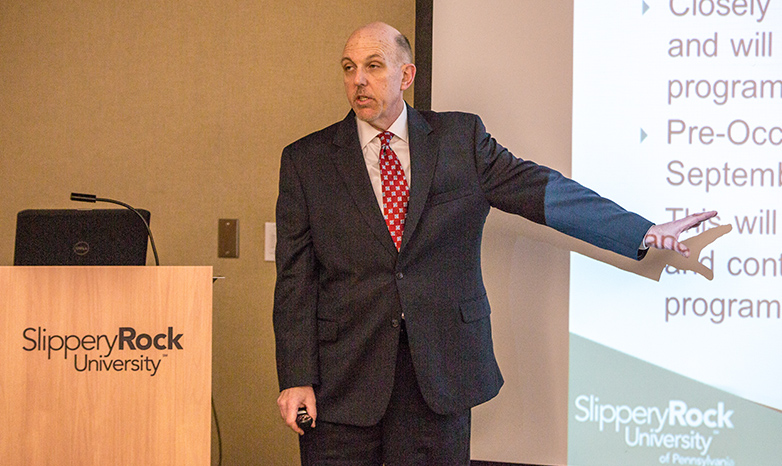SRU Trustees send occupational therapy program to BOG for approval

Jeffrey Loveland, associate professor of biology and coordinator of the Slippery Rock University’s proposed entry-level doctoral degree in occupational therapy program, spoke to SRU’s council of trustees about the program March 23.
March 24, 2017
SLIPPERY ROCK, Pa. - Slippery Rock University's council of trustees voted to advance an entry-level doctoral degree in occupational therapy program to Pennsylvania's State System of Higher Education board of governors for approval.
The program will be presented for action at the BOG's April 5-6 meetings.
The proposed program would be a 36-month, year-round program for students who have earned a bachelor's degree or participate in one of the 3+3 pre-occupational therapy undergraduate tracks at the University.
According to organizers, the program would be delivered face-to-face at SRU's Harrisville Building, in a didactic learning format with off-campus field placements. The new curriculum would focus on contemporary practice using evidence-based strategies to provide students with a dynamic learning experience. All classroom and clinical learning experiences would be driven by standards that are defined by the Accreditation Council for Occupational Therapy Education.
"This program aligns closely with SRU's focus on health and wellness and will join our already successful Doctor of Physical Therapy program," said Jeffrey Loveland, associate professor of biology and coordinator of the proposed program. "The program will be professional in nature, equipping graduates to be practitioners in the field and intelligent consumers of research. Most notably, it will leverage the success of the University's existing master's programs in related fields such as exercise science, therapeutic recreation and athletic training.
"Similarly, since this program will be the only occupational therapy degree in the State System, there will be ripe opportunity for articulation agreements with other institutions in the System."
According to the American Occupational Therapy Association, occupational therapists evaluate and provide people with interventions that promotes participation in the things they want and need to do. Therapeutic treatment can assist clients in functioning in all of their environments - home, work, school and community - and addresses the physical, psychological and cognitive aspects of their well-being through engagement in occupations.
The first academic year of the program is comprised of clinical and applied sciences along with foundational occupational therapy offerings that provide an important introduction to the history, philosophical base and theoretical concepts of the profession, along with therapeutic use of self, research and ethical guidelines, and challenges faced by therapists.
In the second academic year, students are involved in classroom learning experiences that include assessment and intervention with children, youth and adults and related technology that can be utilized with these populations. Concurrent fieldwork experiences are also scheduled with courses that provide instruction in working with children/youth and adults to allow growth in professional knowledge, skills and abilities. Students are engaged in didactic offerings that provide insight into management, leadership, policy, advocacy, clinical educations of clients/families, research and grant writing.
The third year in the program is based primarily off-site in two fieldwork settings and at a doctoral practicum site where capstone projects will be completed. This doctoral experiential practicum is scheduled to allow students to develop advanced skills in clinical practice, research, administration, leadership, program or policy development, advocacy, education or theory development. This requirement is stipulated by ACOTE and is the major academic requirement that differentiates an entry-level doctoral degree and master's degree.
"The purpose of this program is to provide cost-effective training for entry-level occupational therapists with an emphasis on providing advanced learning opportunities to prepare graduates for the challenges that currently confront the professional practitioner," Loveland said. "In particular, the program will focus on assisting special-needs populations to live safely and independently in their preferred environment. Faculty and student-faculty scholarship, combined with the development of emerging practice, will provide important opportunities for service to the Slippery Rock community, Butler County and to metropolitan Pittsburgh."
The increased demand for occupational therapists in the health care and educational systems is driving the need for more practitioners in the region, Loveland added.
"Evidence suggests that the doctorate will gain in popularity in coming years until, eventually, it becomes the required entry-level credential. Given the continued need and projected growth for occupational therapists locally, regionally and nationally, SRU is well positioned to offer a program like this that would complement existing undergraduate and graduate programs at the University; serve the health and rehabilitative needs of the community; and advances the institution's strengths."
If approved, the program would be SRU's third doctoral degree and the second in a clinical health field, joining the physician assistant program.
MEDIA CONTACT: Robb King | 724.738.2199 | robert.king@sru.edu

